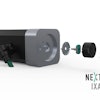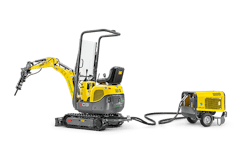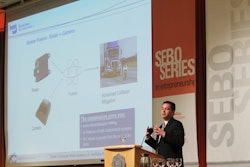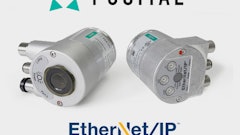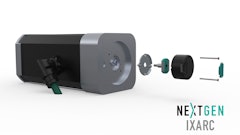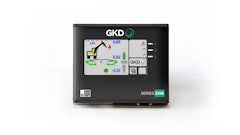Bendix Commercial Vehicle Systems LLC supports the National Highway Traffic Safety Administration’s (NHTSA) choice of ESC (Electronic Stability Control) for its final rule requiring full-stability technology on Class 7 and Class 8 truck tractors and motorcoaches with a gross vehicle weight rating of greater than 11,793 kg (26,000 lbs.). NHTSA will implement the mandate in three phases, starting August 1, 2017, for most three-axle tractors.
“At Bendix, we always prefer to let the market be the catalyst to drive safety technology adoption. We believe ESC stands alone in terms of safety, performance and value. And we have also seen a market acceptance of this technology – over RSC – at a rate of three to one,” says Fred Andersky, Bendix Director of Government and Industry Affairs. “This technology is another positive step on the part of our industry toward helping to further improve highway safety.”
Full-stability technology – which at Bendix is known as Bendix ESP Electronic Stability Program – fully complies with the NHTSA rule. Andersky cautions that it is critical for fleets currently equipping their vehicles either with ABS only, or with roll-only stability systems, to understand three key differences in order to better prepare for the arrival of full stability.
First, full-stability systems use more sensors than either ABS or roll-only stability systems, creating a more comprehensive system capable of addressing both roll and directional stability. These additional sensors enable the unit to more quickly recognize factors that could lead to vehicle rollovers or loss-of-control. On dry surfaces, this means the system recognizes and mitigates conditions that could lead to rollover and loss-of-control situations sooner than roll-only options. Full-stability technology also functions in a wider range of driving and road conditions than roll-only systems, including snowy, ice-covered and slippery surfaces. ABS systems are not designed to react to potential roll or loss-of-control situations.
Second, interventions can also differ. Full-stability systems rely on automatic brake interventions involving the steer, drive and trailer axles, whereas roll-only systems typically apply the brakes only on the drive and trailer axles. Slowing the vehicle quickly helps mitigate rollovers faster, while slowing and redirecting can help the driver maneuver in loss-of-control situations.
Third, stability systems are the foundation for advanced active safety technologies. For example, as a collision mitigation system detects a possible collision with a forward vehicle and automatically applies the brakes in order to prevent or lessen its severity, the brake system should help the vehicle maintain its stability throughout the maneuver. This level of performance is best achieved with a full-stability system that is consistent with the new NHTSA rule.
“In our view, the market had already made its technology choice known prior to the formal introduction of NHTSA’s rule. Industry-wide, full stability is outselling roll-only technology three to one, up from three to two in previous years,” notes Andersky. “The increasing adoption of ESC demonstrates the willingness by fleets to invest in the technology because of full stability’s ability to help reduce the number of heavy truck accidents, improve safety records, and deliver the return on investment that fleets need.”
Aside from the safety benefits, another important aspect of this rule is the reliability of the technology. A proven technology, Bendix introduced its Bendix ESP Electronic Stability Program full-stability system in early 2005 and currently has more than 375,000 units on the highway. All truck, as well as many motorcoach manufacturers, offer full stability as either standard or optional. Bendix ESP is available at coach manufacturers Prevost and Motor Coach Industries (MCI), and tractor manufacturers PACCAR, Volvo and Mack, and Navistar.
The Bendix ESP full-stability system is part of the ever-growing Bendix portfolio of technologies that deliver on safety, plus other areas critical to fleets’ success. Bendix ESP serves as the foundation for Bendix advanced active safety technologies, including:
- Bendix Wingman Advanced – A Collision Mitigation Technology, which combines both adaptive cruise control and collision mitigation to help drivers mitigate or reduce the intensity of potential rear-end collision situations; and
- Bendix Wingman Fusion, a newly launched technology that makes possible stationary vehicle braking, Bendix’s exclusive overspeed alert and action, and more. Wingman Fusion integrates next-generation advanced safety technologies (radar, camera, brakes, and the SafetyDirect web portal) into one comprehensive driver assistance system that‘s more powerful than other safety system technology combinations in the North American commercial vehicle marketplace.
“Because of the ruling, trucks will be safer, drivers will be safer and all of us who share the roads with them will be safer,” Andersky says.
Andersky stresses that Bendix safety technologies, such as Bendix ESP, complement safe driving practices. No commercial vehicle safety technology replaces a skilled, alert driver exercising safe driving techniques and proactive, comprehensive driver training. Responsibility for the safe operation of the vehicle remains with the driver at all times. He also notes that properly maintained and operated, these technologies can help fleets and drivers in their ongoing efforts to operate more safely and efficiently.
Bendix provides commercial fleets, technicians and drivers with the tools they need to ensure safe operation through assessment, maintenance and repair. The Bendix On-Line Brake School at www.brake-school.com provides access to the company’s knowledge database and technical resources on all aspects of electronics and air brake maintenance and product education. The Bendix Brake Training School, one of the industry’s longest-running training programs, has educated more than 250,000 students since its founding more than 50 years ago. Among other tools, the company offers field-tested sales and service professionals; a 100% ASE-certified field technical support team; and the Bendix Tech Team (at 1-800-AIR-BRAKE), an expert technical support group providing service advice, brake system troubleshooting, and product training.
By improving vehicle performance and efficiency and providing unparalleled post-sales support, Bendix aims to strengthen returns on investment in equipment and technology, helping fleets and drivers lower their total costs of vehicle ownership, and enhancing roadway safety.


